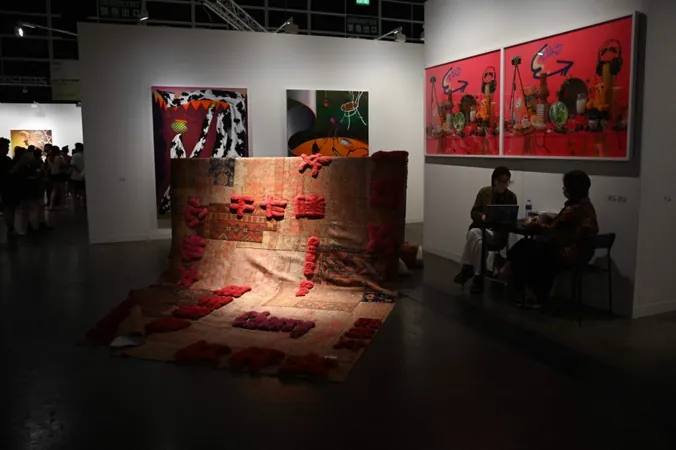
Hong Kong Painter Captures the City's Transformation Amid Historical Turmoil
2025-03-30
Author: Yan
In a poignant showcase at Hong Kong’s Art Basel, renowned painter Chow Chun-fai unveils his latest works that whisk viewers back to the fateful night in 1997 when the British colony transitioned to Chinese rule. This setting, the very exhibition center where a new era began, serves as a stark reminder of the city's complex post-colonial evolution. Since 2020, the political landscape has drastically shifted following the imposition of a national security law by Beijing, which effectively stifled dissent and drove a wave of middle-class families and creatives—including numerous artists—to seek refuge in democratic nations like Britain, Canada, Taiwan, and the US.
Despite such challenges, Chow has made the resolute choice to remain in Hong Kong, vowing to continue documenting his homeland, even as the boundaries of expression become increasingly obscured. His artwork displayed at Art Basel revisits the collective memories of Hong Kong's vibrant late 1990s and early 2000s, a period marked by pride in the city’s uniqueness and spirited openness.
“Throughout history, artists have responded to transformative moments. We are currently living through such a pivotal time, and I strive to learn from it,” Chow stated in an interview before his exhibition.
Widely recognized beyond the art community for his creative reimaginings of iconic movie scenes coupled with bilingual subtitles, Chow’s pieces provoke thought and introspection on the complexities of Hong Kong's identity. His previous foray into politics, challenging pro-establishment candidates during the 2012 and 2016 elections, further underscores his commitment to civic engagement, albeit met with defeats.
At Art Basel, Chow’s compelling works reflect on significant milestones, from the 1997 handover to the notable milestones of Chinese leadership, including nostalgia around the 2008 Beijing Olympic Games. Notably, one painting revisits a contentious 2000 encounter with the late Chinese President Jiang Zemin, who expressed frustration over a journalist's question regarding Hong Kong leadership—a scene that resonates with Chow's exploration of political commentary through art.
In another series titled “Panda,” Chow humorously captures Jiang's interaction during a trip to the US, where the leader jokingly distanced himself from panda expertise. “Pandas have become a trending topic recently, particularly following the birth of panda twins last year, sparking widespread fascination,” Chow explained. This light-hearted moment stands in contrast to today's stark reality, where Chinese leaders seldom engage with journalists from Hong Kong.
With the backdrop of intensifying Chinese governmental control after the massive anti-government protests of 2019, dissenting voices in Hong Kong have faced unprecedented suppression. Outlets like Apple Daily and Stand News were shuttered amid crackdowns, impacting the cultural landscape and leading to self-censorship in various sectors. As SC Gallery’s director, Sharon Cheung, remarked, despite the intimidating climate, she and Chow refuse to let fear silence their expression. Art, she argues, provides an invaluable distance for interpretation and reflection.
As Hong Kong also celebrates its return to grand-scale events such as the Rugby Sevens and Art Basel as part of a broader tourism initiative, the city is experiencing a cautious revival. Following the lifting of strict COVID-19 restrictions, visitor numbers are recovering, though still grappling with challenges like increased airfares and a labor shortage that hinder full industry revitalization.
The Rugby Sevens, held at the new Kai Tak stadium, has reached record ticket sales, evidencing strong corporate interest. Coupled with Art Basel's remarkable 130% year-on-year growth driven by significant participation from East and Southeast Asian countries, it marks a crucial moment in Hong Kong's journey toward recovery.
In 2024, preliminary figures revealed visitor arrivals rebounded to 68% of 2018's peak, with substantial growth in tourists from the Philippines, Indonesia, Japan, and South Korea. Australia exhibited an impressive 34% increase, indicating a renewed global interest in this dynamic financial hub even amid ongoing political tensions.
As artists like Chow reflect the past and present of Hong Kong through their work, their resilience echoes a broader narrative of innovation and survival within a vibrant cultural landscape reshaping itself amid adversity.

 Brasil (PT)
Brasil (PT)
 Canada (EN)
Canada (EN)
 Chile (ES)
Chile (ES)
 Česko (CS)
Česko (CS)
 대한민국 (KO)
대한민국 (KO)
 España (ES)
España (ES)
 France (FR)
France (FR)
 Hong Kong (EN)
Hong Kong (EN)
 Italia (IT)
Italia (IT)
 日本 (JA)
日本 (JA)
 Magyarország (HU)
Magyarország (HU)
 Norge (NO)
Norge (NO)
 Polska (PL)
Polska (PL)
 Schweiz (DE)
Schweiz (DE)
 Singapore (EN)
Singapore (EN)
 Sverige (SV)
Sverige (SV)
 Suomi (FI)
Suomi (FI)
 Türkiye (TR)
Türkiye (TR)
 الإمارات العربية المتحدة (AR)
الإمارات العربية المتحدة (AR)